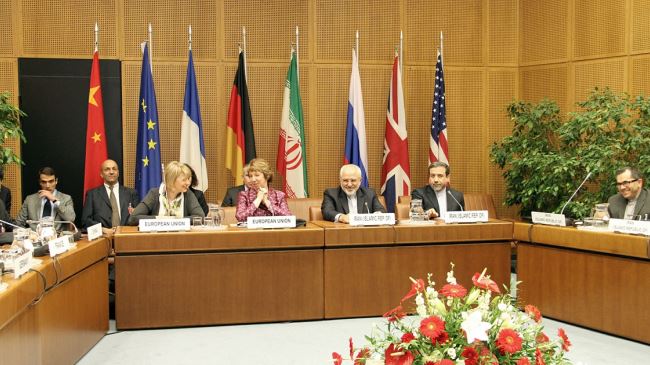 A general view of the latest round of talks over Iran�s nuclear energy program which kicked off in the Austrian capital city of Vienna on July 3, 2014[/caption]
A general view of the latest round of talks over Iran�s nuclear energy program which kicked off in the Austrian capital city of Vienna on July 3, 2014[/caption]With less than one month left until the deadline for reaching a final nuclear deal between Iran and world powers, the two sides made "tangible progress" in a meeting held last Wednesday in Vienna, an Iranian negotiator said Monday.
"In the last expert-level meeting in Vienna, Iran and the P5+1 had tangible progress in technical issues," the senior diplomat told Kyodo News on condition of anonymity.
The diplomat's remarks echoed those of Wendy Sherman, the top U.S. negotiator in the talks to limit Iran's nuclear program in exchange for sanctions relief, who said Thursday the two sides "have made impressive progress on issues that originally seemed intractable."
"There does, however, remain much hard work to be done," she added.
The expert-level meeting followed the two sides' eight round of talks held in Vienna on Oct. 16 between delegations led by Iranian Foreign Minister Mohammad Javad Zarif and EU foreign policy chief Catherine Ashton, which focused on such issues as the size and scope of Iran's enrichment activities, the procedure of sanctions removal and the duration of the final agreement.
Some Western diplomats are talking about possibly extending the talks, which from their perspective are aimed at persuading Iran to take convincing and verifiable steps to show that its nuclear program is and will remain entirely peaceful.
But Iran, which seeks a lifting of international sanctions imposed on it for having violated its obligations under the Nuclear Non-Proliferation Treaty by engaging in covert nuclear-weapons-related activities, considers an extension "unnecessary," according to the Iranian negotiator.
"Both sides prefer to reach a deal by the deadline," the diplomat said, echoing Iranian President Hassan Rouhani's remarks in a press conference last Wednesday that achieving a final agreement in the remaining time is possible.
Iran and the six powers -- the five U.N. Security Council permanent members Britain, China, France, Russia, the United States plus Germany -- have specified Nov. 24 as the deadline for reaching a comprehensive deal.
Under a Joint Plan of Action agreed between the two sides in Geneva last November, Iran, in return for limited sanctions relief, committed to freeze and even roll back key components of its nuclear activities while talks are under way.
Specifically, it has halted the expansion of its overall enrichment capacity; put a cap on its stockpile of low-enriched uranium hexafluoride; stopped the production of uranium enriched to 20 percent; agreed not to make further advances at the Arak heavy water reactor; and opened the door to unprecedented daily access for international inspectors to the facilities at Natanz and Fordow.
The West says more extensive relief will only come when the two sides arrive at a comprehensive deal that addresses international concerns about Iran's nuclear ambitions, namely by effectively blocking all of its potential paths to obtaining fissile material for nuclear weapons.
"Our bottom line is unambiguous, crystal clear, and, quite frankly, written in stone: Iran will not, shall not obtain a nuclear weapon," Sherman, U.S. undersecretary for political affairs, said in an address at a symposium in Washington.
"An Iran equipped with nuclear arms would add an unacceptable element of instability and danger to a part of the globe that already has a surplus of both," she said.
"If Iran truly wants to resolve its differences with the international community and facilitate the lifting of economic sanctions, it will have no better chance than between now and Nov. 24. This is the time to finish the job," she added.
Iran, insisting its nuclear activities are for "peaceful purposes," has vowed to continue pursuing a civilian nuclear program, including uranium enrichment, suitable to its economic needs.
In his address at the U.N. General Assembly last month, Rouhani said any delay in arriving at a final agreement "only raises the costs" -- and not only for Iran -- while he cautioned his country's negotiating partners to avoid making "excessive demands" if they want the negotiations to succeed.
"No one should doubt that compromise and agreement on this issue is in the best interest of everyone, especially that of the nations of the region," he said, stressing the need for regional cooperation to combat "extremism, threats, and aggression."
By Global Post
The Iran Project is not responsible for the content of quoted articles.










